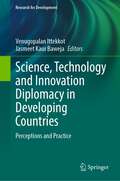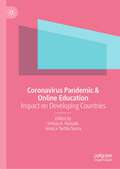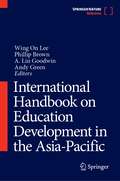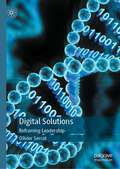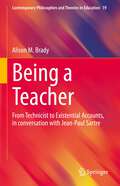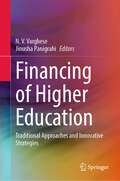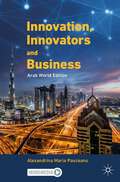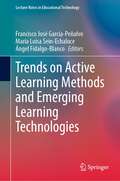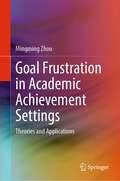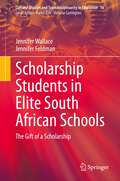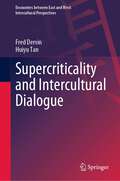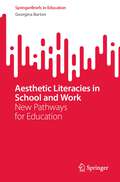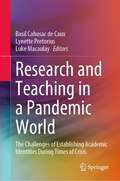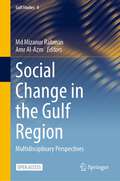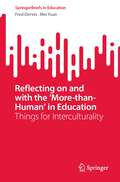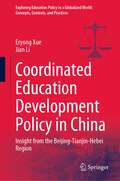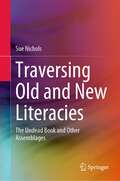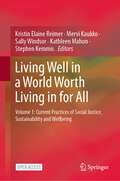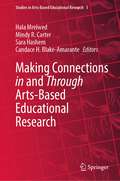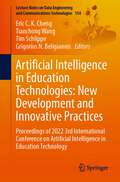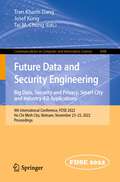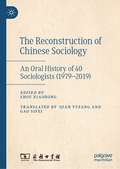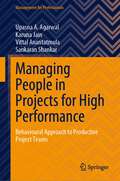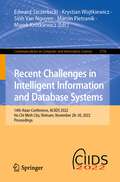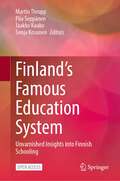- Table View
- List View
Science, Technology and Innovation Diplomacy in Developing Countries: Perceptions and Practice (Research for Development)
by Venugopalan Ittekkot Jasmeet Kaur BawejaThis book provides a developing country perspective on the internationalization of science and the role of Science, Technology and Innovation Diplomacy (STID) in leveraging scientific cooperation for sustainable development. In articles by individuals from government departments and academic & research institutions in nine developing countries, it provides a conceptual understanding of the subject and reveals the prevailing perceptions on its praxis/practices. The articles highlight the significance of international cooperation at bilateral, regional and multilateral levels and the need for strengthening the role of STID in foreign policy and strategies of governments. The book is a useful reference material to government officials, diplomats,academicians, researchers, science counsellors, international relations experts, science and technology professionals and other stakeholders from the developing countries and transition economies, dealing with economic and developmental policy issues and/or science, technology and innovation (STI) issues in understanding the praxis and prospects of STID. The book is also useful for scholars and international relations experts from developed countries in understanding STI and related issues that affect the relationship of developing countries and transition economies with their partners from the developed world.
Coronavirus Pandemic & Online Education: Impact on Developing Countries
by Imtiaz A. Hussain Jessica Tartila SumaIn this book, eight substantive chapters examine how “developing” countries such as Bangladesh, Malaysia, and Mexico confronted the pandemic-driven online education shift. As local instruments, resources, and preferences of specific universities meshed with global platforms, ideas, and knowledge, the book addresses several questions. Was the mix too flaky to survive increasing competitiveness? Were countries capable enough to absorb mammoth software technological changes? Throwing a “developed” country (the United States) in for contrast, the book elaborates on the inequities between these countries. Some of these inequalities were economic (infrastructural provisions and accesses), others involved gender (the role of women), political (the difference between public and private universities), social (accessibility across social spectrum), and developmental (urban-rural divides). In doing so, new hypotheses on widening global gaps are highlighted in the book for further investigation.
International Handbook on Education Development in the Asia-Pacific
by Wing On Lee Phillip Brown A. Lin Goodwin Andy GreenThe Springer International Handbook of Educational Development in Asia Pacific breaks new ground with a comprehensive, fine-grained and diverse perspective on research and education development throughout the Asia Pacific region. In 13 sections and 127 chapters, the Handbook delves into a wide spectrum of contemporary topics including educational equity and quality, language education, learning and human development, workplace learning, teacher education and professionalization, higher education organisations, citizenship and moral education, and high performing education systems. The Handbook is grounded in specific Asia Pacific contexts and scholarly traditions, using unique country-specific narratives, for example, Vietnam and Melanesia, and socio-cultural investigations through lenses such as language identity or colonisation, while offering parallel academic discourse and analyses framed by broader policy commentary from around the world.
Digital Solutions: Reframing Leadership
by Olivier SerratThis book acts as a valuable quick-access resource on the challenges and opportunities that the digital age presents to organizational leadership. Balanced, comprehensive, and thought-provoking, the book will be useful to professionals and practitioners. The book broadly follows a macro, meso, and micro approach to argumentation and is best read from beginning to end. The book synopsizes the historical context of technological revolutions and reflects on first-order results from enhanced use of information and communication technology in organizations; considers second-level impacts from information and communication technology on economy, society, work, and the very act of organizing; maps out core concepts of agility and principles that leaders should honor to exploit agility in newfound workforce ecosystems; showcases emerging leadership behaviors and mindsets; and specifies the good practice needed to plan and lead digital strategies. The book invites reference to the author's popular Knowledge Solutions: Tools, Methods, and Approaches to Drive Organizational Performance (2017) and the more recent Leading Solutions: Essays in Business Psychology (2021), which it both rests on and extends.
Being a Teacher: From Technicist to Existential Accounts, in conversation with Jean-Paul Sartre (Contemporary Philosophies and Theories in Education #19)
by Alison M. BradyThis book re-conceptualizes teaching through an engagement with Jean-Paul Sartre’s early existentialist thought. Against the grain of teacher accountability, it turns to the demanding account of being human in Sartre’s thought, on the basis of which an alternative account of teaching can be developed. It builds upon Sartre’s key concepts related to the self, freedom, bad faith, and the Other, such that they might open up original ways of thinking about the practices of teaching. Indeed, given the everyday complexities that characterize teaching, as well as the vulnerabilities and uncertainty that it so often involves, this book ultimately aims to create a space in which to reimagine forms of accounting that move from technicist ways of thinking to existential sensitivity in relation to one’s practice as a teacher.
Financing of Higher Education: Traditional Approaches and Innovative Strategies
by N. V. Varghese Jinusha PanigrahiThis book reviews and analyses higher education financing and explores the innovative ways by both public higher education and private higher education institutes in the context of globalization, with India, Russia and Tanzania as a case study. It examines the diverse policy discourses which greatly influence the higher education systems based on evidence-based research. This book is arranged into four major themes. Part 1 deals with the various possible modes of financing of higher education, such as the credit market and voucher system. Part 2 deals with strategies to mobilize the resources. Part 3 deals with innovative and sustainable approaches to financing private higher education institutions. Part 4 discusses the policies and limitations with external financing of higher education. It is an interesting collection of various themes in different chapters by serious researchers. It is an excellent read for students, educators and policymakers interested in alternative and innovative practices in higher education financing. It is a highly informative book for researchers providing insights on how social and political dynamics impact higher education financing.
Innovation, Innovators and Business: Arab World Edition
by Alexandrina Maria PauceanuThis textbook approaches innovation and innovators as two elements of an equation with business application. It discusses creativity, methods to develop creativity, design thinking, the lean startup and minimum viable product (MVP), personal development for entrepreneurs, charisma, franchising and cases from the UAE. It is designed to be a practical and up-to-date resource for an innovation and entrepreneurship course. It contains practical information about the innovation frameworks and their applicability, explanation of creativity and creative mindset, methods of innovation, design thinking in practice, lean startup methodology, charisma, setting up a business, go-to-market strategies, growth and change as well as franchise management. It comes with worksheets to help the reader in practicing. The book solves the need of having innovation resources in one place, well explained and exemplified for students, aspirant and existing entrepreneurs as well as innovation enthusiasts.
Trends on Active Learning Methods and Emerging Learning Technologies (Lecture Notes in Educational Technology)
by Francisco José García-Peñalvo María Luisa Sein-Echaluce Ángel Fidalgo-BlancoThis book uncovers the crucial issues in learning technologies in this digital transformation moment, specifically within the COVID-19 umbrella effects. Remote learning, educational technologies, or distance learning are usually used topics by teachers, students, and researchers because the educational context should be transformed and even reinvented itself drastically. Technologies have been used more intensively in the last year than during the last decade. However, what is the effect of these "new" technologies on the teaching and learning methodologies? Are teachers and students fully digital competent to integrate these technologies in their teaching and learning activities? In this book, the authors claim to go forward that the online teaching conception to replicate the face-to-face teaching through a camera. They propose adapting the active methodologies to the online or hybrid context, which is a challenge that must be corroborated with rigorous educational research.
Goal Frustration in Academic Achievement Settings: Theories and Applications
by Mingming ZhouThis book provides in-depth description, explanation, and discussion of goal frustration. It brings together a repertoire of perspectives and strategies that educators and scholars from diverse educational contexts have conceptualized and/or implemented in order to monitor, control, or overcome the occurrence of frustration. This book describes the new technologies can be applied in the conceptualization and operationalization of goal frustration. It also discusses the strategies and pedagogies we can use to cope with this emotion. This book offers evidence-based reports of goal frustration as well as data-driven approaches by presenting both theoretical account and empirical evidence that are grounded in educational and psychological research. This work will appeal to a wider readership from practitioners, parents, to educational researchers.
Scholarship Students in Elite South African Schools: The Gift of a Scholarship (Cultural Studies and Transdisciplinarity in Education #16)
by Jennifer Wallace Jennifer FeldmanThis book provides a narrative account of the experiences of twenty former scholarship students from historically disadvantaged communities who attended elite public and private secondary schools. It draws on in-depth, one-on-one semi-structured interviews conducted with former scholarship recipients who were between the ages of 19 and 24 years at the time of the interviews. Various themes are explored, specifically focusing on elite schooling in relation to the experiences and navigational practices of the scholarship recipients and the adjustments that they felt they needed to make in order to fit into the elite school space.The book analyses and discusses the reflective experiences of students who were awarded a scholarship to attend an elite secondary school. It reveals that accepting the gift of a scholarship is far more complex, multi-layered, and at times harsh and even painful for the individual recipients than is possibly realized by those involved in this practice. This book contributes to academic educational debates within the sociology of education, elite schools and schooling in the post-apartheid South African context.
Supercriticality and Intercultural Dialogue (Encounters between East and West)
by Fred Dervin Huiyu TanThis book offers a snapshot of interculturality as a complex, unstable and highly political object of research and education when it locates at the centre of multifaceted dialogues between teachers and students; students and students; teachers, students, scholars and readers. The context of the book is a Chinese course on intercultural communication education where students engage with local and international teachers. By listening to the intriguing and stimulating voices of these students in dialogue with the teachers, the reader also has the opportunity to enter the intercultural world of Chinese youth, beyond stereotypes. The unique approach proposed in the book is of interest to students, teachers of intercultural communication education, teacher educators, researchers and anyone wishing to build up supercriticality in relation to the fascinating notion of interculturality. The book contains 15 chapters and revolves around five main dialogues between the students and their teachers. Following each dialogue, the floor is given to the students to react to the dialogues and to share their views on questions that emerged from the main dialogues. The book conveys the authors’ excitement about approaching interculturality in supercritical ways, engaging in the process with multiple voices.
Aesthetic Literacies in School and Work: New Pathways for Education (SpringerBriefs in Education)
by Georgina BartonThis book argues the importance of aesthetic literacies in learning and teaching in schools for future work. The study of aesthetics is critical in today’s learning, due to the increasingly complex ways in which we communicate meaning, such as through the presentation of texts and objects. The book provides educators, pre-service teachers, and students an in-depth understanding of aesthetic literacies in innovative spaces, including in philosophical literature, environmental spaces, curricula and classrooms. Using various theoretical frames from both the arts and literacy fields, this book shares relevant pedagogies, theorisations and contexts where aesthetic literacies are at the core of learning. It emphasises how improved knowledge of aesthetics and quality experiences in beauty are vital in aiding students and young children develop the necessary resilience and tolerance needed in today’s uncertain world.
Research and Teaching in a Pandemic World: The Challenges of Establishing Academic Identities During Times of Crisis
by Basil Cahusac de Caux Lynette Pretorius Luke MacaulayThis book adopts collaborative autoethnography as its methodology, and presents the collective witnessing of experiences of the COVID-19 pandemic within the higher education sector. Through the presentation of staff and student experiences and what was learnt from them, the authors examine the global phenomenon that is the COVID-19 pandemic through the purposeful exploration of their own experiences. This book presents an overall argument about the state of higher education in the middle of the pandemic and highlights academic issues and region-specific challenges. The reflections presented in this book offer insights for other staff and students, as well as academic policy-makers, regarding the pandemic experiences of those within academia. It also offers practical suggestions as to how we as a global community can move forward post-pandemic.
Social Change in the Gulf Region: Multidisciplinary Perspectives (Gulf Studies #8)
by Md Mizanur Rahman Amr Al-AzmThis open access book, comprising thirty-nine chapters divided into social, cultural, economic, and political spheres, offers a unique opportunity to dive into the complex, dynamic, and sometimes contradictory transformation of Gulf societies in the last few decades. Whilst the Gulf region has at times been seen as impervious to this natural phenomenon of transformation—timeless, never changing, deeply rooted in its ancient tribal customs and traditions and able to blend past and present seamlessly without suffering the wrenching trauma of change—this is clearly not the case, and the region is not immune to the inevitable forces of social change. There is no doubt today that the social change sweeping the Gulf has been profound, affecting almost every aspect of life in the Gulf societies. This volume has an encyclopedic value as the chapters collectively offer multifaceted and multidisciplinary perspectives to understand social change in the Gulf region. Through these chapters, the role of economic and educational transformation, and the impact of social media, migration, and urbanization have in driving social change in the Gulf societies is examined in detail with a focus on their directions, magnitudes, and relevant policy options. It also considers how COVID-19 is affecting the lives of the people in the Gulf. This book bridges gaps in the understanding of the rapid pace of social change in the Gulf, offering practical solutions for policy interventions. It is of interest to scholars and students in Middle Eastern studies, specifically, as well as sociology, media studies, migration studies, and educational policy.
Reflecting on and with the ‘More-than-Human’ in Education: Things for Interculturality (SpringerBriefs in Education)
by Fred Dervin Mei YuanThis book examines today’s central and yet often misunderstood and misconstrued notion of interculturality. It specifically focuses on one aspect of intercultural awareness that has been ignored in research and education: the presence and influence of things on the way we experience, do, and reflect on interculturality. This book provides the readers with opportunities to engage with interculturality by reflecting on how our lives are full of things and entangled with them. It urges teachers, teacher educators, scholars, and students to open their eyes to the richness that the more-than-human, with which we can reflect, has to offer for intercultural communication education.
Coordinated Education Development Policy in China: Insight from the Beijing-Tianjin-Hebei Region (Exploring Education Policy in a Globalized World: Concepts, Contexts, and Practices)
by Eryong Xue Jian LiThis book examines educational resource allocation in Beijing, the allocation of educational resources in student resource optimization analysis in Tianjin, educational resource allocation in Hebei Province, and the optimal allocation of vocational education resources in Beijing, Tianjin, and Hebei. It also offers a holistic landscape of exploring coordinated education development historically. This book has interdisciplinary appeal and is of interest to all studying and researching Chinese educational policy.
Traversing Old and New Literacies: The Undead Book and Other Assemblages
by Sue NicholsThis book re-examines the field of New Literacy Studies and promotes a shift away from binary constructions of literacies as 'old' or 'new' and to encourage critical reflection on the part of readers as to the uses of these constructs. First, the book examines the entanglement of pasts, presents and futures in contemporary literacy practices. Second, it considers representations of literacies as actors, having their own power and consequences. Third, it critically examines the place of 'new' and 'old' literacies in a marketplace in which social, economic and political power advantage is contested. The book demonstrates the use of assemblage theory drawing on semiotics, geo-semiotics and Actor Network Theory for analyzing literacies as assemblages. It provides readers with tools of analysis with which to interrogate claims made for the value of literacy, innovations and traditions alike. It also discusses implications for literacy policy, curriculum, teacher education and research.
Living Well in a World Worth Living in for All: Volume 1: Current Practices of Social Justice, Sustainability and Wellbeing
by Kristin Elaine Reimer Mervi Kaukko Sally Windsor Kathleen Mahon Stephen KemmisThis open access book is the first of a two-volume series focusing on how people are being enabled or constrained to live well in today’s world, and how to bring into reality a world worth living in for all. The chapters offer unique narratives drawing on the perspectives of diverse groups such as: asylum-seeking and refugee youth in Australia, Finland, Norway and Scotland; young climate activists in Finland; Australian Aboriginal students, parents and community members; families of children who tube feed in Australia; and international research students in Sweden. The chapters reveal not just that different groups have different ideas about a world worth living in, but also show that, through their collaborative research initiative, the authors and their research participants were bringing worlds like these into being. The volume extends an invitation to readers and researchers in education and the social sciences to consider ways to foster education that realises transformed selves and transformed worlds: the good for each person, the good for humankind, and the good for the community of life on the planet. The book also includes theoretical chapters providing the background and rationale behind the notion of education as initiating people into ‘living well in a world worth living in'. An introductory chapter discusses the origins of the concept and the phrase.
Making Connections in and Through Arts-Based Educational Research (Studies in Arts-Based Educational Research #5)
by Hala Mreiwed Mindy R. Carter Sara Hashem Candace H. Blake-AmaranteThis book explores the connections made in and through arts-based educational research through four themes: socially engaged connections, cultural connections, personal and pedagogical connections, and making connections during the COVID-19 pandemic. It emerges from the 3rd bi-annual 2020 Artful Inquiry Research Group symposium on the theme of “connections”. The symposium brought together artists, community members, teachers, students, and researchers through a virtual platform to examine the way(s) in which the arts can help connect people, ideas, and spaces/places in a pandemic reality. Art plays a predominant role in each chapter as authors weave their research and art-based understandings together. This book is a valuable teaching resource for undergraduate and postgraduate courses in teaching, anthropology, digital ethnography, autoethnography, cultural studies, and communications. It is of interest to higher education students, academic researchers, and teachers exploring arts-based methodologies in the fields of creative practice and creativity studies, communications, critical studies, sociology, sciences, teacher education, and the arts.
Artificial Intelligence in Education Technologies: Proceedings of 2022 3rd International Conference on Artificial Intelligence in Education Technology (Lecture Notes on Data Engineering and Communications Technologies #154)
by Eric C. K. Cheng Tianchong Wang Tim Schlippe Grigorios N. BeligiannisThis edited book is a collection of selected research papers presented at the 2022 3rd International Conference on Artificial Intelligence in Education Technology (AIET 2022), held in Wuhan, China, on July 1–3, 2022. AIET establishes a platform for AI in education researchers to present research, exchange innovative ideas, propose new models, as well as demonstrate advanced methodologies and novel systems. The book is divided into five main sections – 1) AI in Education in the Post-COVID New Norm, 2) Emerging AI Technologies, Methods, Systems and Infrastructure, 3) Innovative Practices of Teaching and Assessment Driven by AI and Education Technologies, 4) Curriculum, Teacher Professional Development and Policy for AI in Education, and 5) Issues and Discussions on AI In Education and Future Development. Through these sections, the book provides a comprehensive picture of the current status, emerging trends, innovations, theory, applications, challenges and opportunities of current AI in education research. This timely publication is well aligned with UNESCO’s Beijing Consensus on Artificial Intelligence (AI) and Education. It is committed to exploring how AI may play a role in bringing more innovative practices, transforming education in the post-pandemic new norm and triggering an exponential leap toward the achievement of the Education 2030 Agenda. Providing broad coverage of recent technology-driven advances and addressing a number of learning-centric themes, the book is an informative and useful resource for researchers, practitioners, education leaders and policy-makers who are involved or interested in AI and education.
Future Data and Security Engineering. Big Data, Security and Privacy, Smart City and Industry 4.0 Applications: 9th International Conference, FDSE 2022, Ho Chi Minh City, Vietnam, November 23–25, 2022, Proceedings (Communications in Computer and Information Science #1688)
by Tran Khanh Dang Josef Küng Tai M. ChungThis book constitutes the refereed proceedings of the 9th International Conference on Future Data and Security Engineering, FDSE 2022, held in Ho Chi Minh City, Vietnam, during November 23–25, 2022. The 41 full papers(including 4 invited keynotes) and 12 short papers included in this book were carefully reviewed and selected from 170 submissions. They were organized in topical sections as follows: invited keynotes; big data analytics and distributed systems; security and privacy engineering; machine learning and artificial intelligence for security and privacy; smart city and industry 4.0 applications; data analytics and healthcare systems; and security and data engineering.
The Reconstruction of Chinese Sociology: An Oral History of 40 Sociologists (1979–2019)
by Zhou XiaohongTracing the evolution of Chinese Sociology from the late 1970s to the present day, the book aims to record the path of reconstruction, localization, change, and reform of Chinese Sociology through interviews with 40 Chinese top sociologists such as Su Guoxun, Zhou Xiaohong, Bian Yanjie, Zhao Dingxin, Zhou Xueguang et al. Divided into three sections, this insightful book is the best proof of the rapid development and overall improvement of the discipline since the reform and opening-up in China. On the occasion of the 40th anniversary of the restoration and reconstruction of Chinese Sociology, this book is expected to inspire the younger generation of sociology researchers and deepen public’s understanding of sociology.
Managing People in Projects for High Performance: Behavioural Approach to Productive Project Teams (Management for Professionals)
by Upasna A. Agarwal Karuna Jain Vittal Anantatmula Sankaran ShankarThis book examines practically useful management and people skills, and looks at competencies from the micro, meso, and macro- lens. At the micro- level, the book examines a range of competencies needed for managing oneself and others in a project environment, such as personality style, cognitive skills, communication skills, and emotional intelligence. The book will also includes discussion on strategies for managing emotions of self and others effectively. At the meso- level, the book discusses basic structure, characteristics, and importance of different types of teams such as virtual teams, project teams, domain specific teams, and heavy-weight teams in organizations to enhance productivity and delegate accountability. It also explores team processes, including structure, culture, supporting systems, performance and incentive systems, and their impact on team productivity. In addition, the book includes a discourse on skills to manage a multi-generational workforce (a combination of baby boomers, X and Y generation), a challenge faced by project managers in current scenario. Finally, at the macro- level, the book captures the role of culture in a project context; emerging leadership styles in projects, maintaining relationship with internal and external stakeholders; role of power, politics and influence in relationship building (social networks and social capital); and managing conflicts and negotiations. The book presents ethical considerations in managing projects; relationship between projects and sustainability; societal responsibilities of projects; advantages and disadvantages of forms of control in projects (behaviour and outcome control). It is positioned primarily for practitioners although it is a relevant and useful resource and reference for academics and students of project management and management studies courses.
Recent Challenges in Intelligent Information and Database Systems: 14th Asian Conference, ACIIDS 2022, Ho Chi Minh City, Vietnam, November 28-30, 2022, Proceedings (Communications in Computer and Information Science #1716)
by Edward Szczerbicki Krystian Wojtkiewicz Sinh Van Nguyen Marcin Pietranik Marek KrótkiewiczThis book constitutes the refereed proceedings of the 14th Asian Conference on Intelligent Information and Database Systems, ACIIDS 2022, held in Ho Chi Minh City, Vietnam, in November 2022. This volume contains 60 peer-reviewed papers selected for poster presentation from 406 submissions. Papers included in this volume cover the following topics: data mining and machine learning methods, advanced data mining techniques and applications, intelligent and contextual systems, natural language processing, network systems and applications, computational imaging and vision, decision support and control systems, and data modeling and processing for industry 4.0.
Finland’s Famous Education System: Unvarnished Insights into Finnish Schooling
by Martin Thrupp Piia Seppänen Jaakko Kauko Sonja KosunenThis open access book provides academic insights and serves as a platform for research-informed discussion about education in Finland. Bringing together the work of more than 50 authors across 28 chapters, it presents a major collection of critical views of the Finnish education system and topics that cohere around social justice concerns. It questions rhetoric, myths, and commonly held assumptions surrounding Finnish schooling.This book draws on the fields of sociology of education, education policy, urban studies, and policy sociology. It makes use of a range of research methodologies including ethnography, case study and discourse analysis, and references the work of relevant theorists, including Bourdieu and Foucault. This book aims to provide a critical, updated and astute analysis of the strengths and challenges of the Finnish education system.
